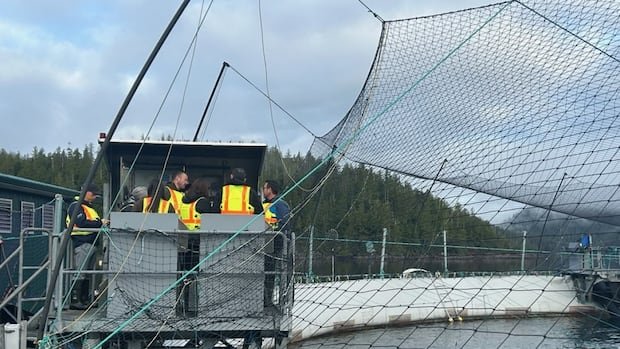A hereditary chief from the Ahousaht Nation is urging the Canadian government to scrap its proposed ban on open-net fish farms along the British Columbia (B.C.) coast. Originally set for 2025, the ban was delayed to June 2029 by the federal fisheries minister last year in response to concerns from environmentalists and several First Nations groups. These groups argue that open-water fish farms pose a threat to wild salmon populations by potentially spreading diseases.
The hereditary chief, known as hasheukumiss, who serves as the president of the Ahousaht’s economic development organization, highlighted the benefits that fish farms bring to their community. With 12 fish farms in Ahousaht territory near Tofino on Vancouver Island’s west coast operated by Cermaq, a Norwegian aquaculture company, the nation has a protocol agreement with Cermaq that governs the company’s operations.
The Maaqutusiis Hahoulthee Stewardship Society (MHSS), Ahousaht’s economic development entity, receives financial support from Cermaq, which is reinvested into various community projects. Additionally, the farms provide employment for around 50 Ahousaht Nation members. Collaborating closely with Cermaq, hasheukumiss emphasized efforts to minimize sea lice and pathogens in the fish farms through stringent protocols, with the potential consequence of asking the company to leave if they fail to meet set standards.
Recent reports from Cermaq, MHSS, and the Ahousaht Nation indicated successful reduction of sea lice levels below the thresholds established by Fisheries and Oceans Canada, showcasing the positive impact of indigenous involvement in monitoring and implementing strict protocols. With their biologist verifying Cermaq’s findings, hasheukumiss expressed confidence in the continuous innovation and technological advancements to mitigate risks to wild salmon stocks posed by farmed fish.
However, hasheukumiss expressed concerns that the federal government’s plan to ban all open-net fish farms on the B.C. coast, including those in Ahousaht territory, would infringe on the nation’s rights to protect its lands and people, as well as violate the government’s duty to consult. In contrast, Bob (Galagame’) Chamberlin, the head of the First Nation Wild Salmon Alliance, disagreed, asserting that fish farms have detrimental effects on wild salmon populations, citing the increased sockeye salmon return to the Fraser River this year as evidence of positive outcomes following the removal of certain fish farms from Vancouver Island’s east side.
Chamberlin emphasized the necessity for the federal government to consider the fishing rights of all B.C. First Nations when implementing the ban, noting that a majority of these nations support the ban. Fisheries and Oceans Canada was contacted regarding the status of the 2029 phase-out deadline for fish farms but provided a generic statement affirming the government’s commitment to fostering a sustainable aquaculture sector in collaboration with various stakeholders.
